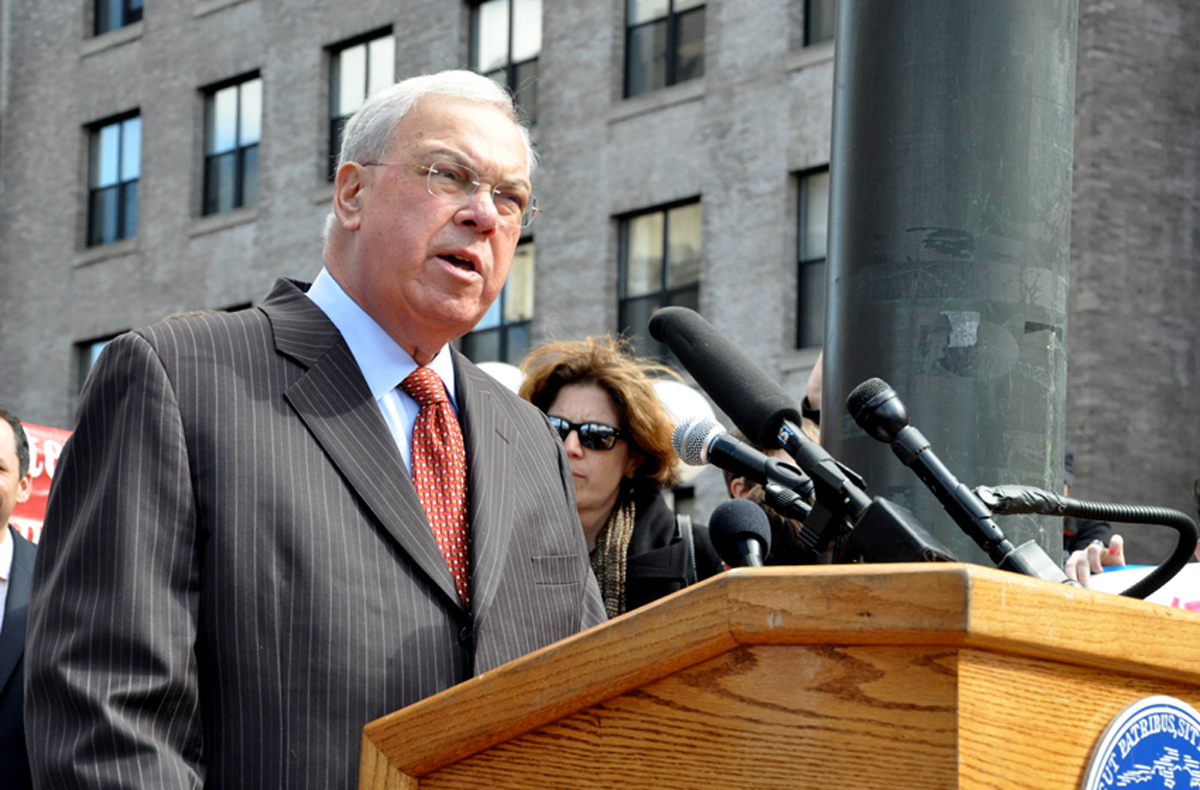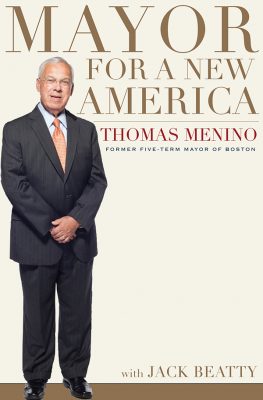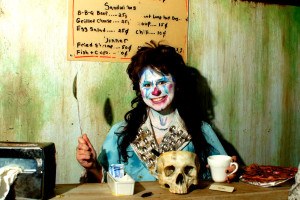12 Times Tom Menino Gets Emotional in His New Book

Photo by Regina Mogilevskaya for Boston Magazine
Even if you shouldn’t, sometimes you can judge a book by its cover. There’s nothing too splashy about the book jacket for Mayor for a New America, former Boston Mayor Tom Menino’s new memoir, out Tuesday. And readers hoping for a scene with an emotional breakdown or explosive outburst will be disappointed.
 The book is a solid 250-page overview of his 20 years as mayor—yes, he talks about the BRA, busing, the Innovation District, and so on. But a riveting autobiography, this one’s not. The book is written in first person, but it reads like an authorized biography. Even the structure of storytelling gets tired after a while: 1) A little background info on the issue at hand, 2) Here’s what I did, and 3) This is what the Globe editorialized.
The book is a solid 250-page overview of his 20 years as mayor—yes, he talks about the BRA, busing, the Innovation District, and so on. But a riveting autobiography, this one’s not. The book is written in first person, but it reads like an authorized biography. Even the structure of storytelling gets tired after a while: 1) A little background info on the issue at hand, 2) Here’s what I did, and 3) This is what the Globe editorialized.
To be fair, the stoic style suits Menino—if you’re looking for a wild one, wait for Rob Ford to get a book deal. While most of Menino’s memoir won’t teach you anything new, there are moments—glimmers, really—in Mayor for a New America when he lets his personality and emotions shine through. Just a little bit.
Here are some examples:
1. Resilience
The moment Mayor Menino stood up after the Boston Marathon was certainly a memorable one. Menino recalls the urge to prove his strength at that moment:
A statement to a reporter from a local professor had stuck in my craw. Referring to my retirement at the end of 2013, he said, “It is unfortunate that one of the last impressions people will have of his mayoralty is him in a wheelchair, almost sidelined at a time of crisis.” … At the interfaith service…I knew what to do. “Tommy,” I said, “I’m the mayor. Wheel me to the pulpit. I’m going to stand up.” [page 11]
2. Grief
While the bulk of the book looks at Menino’s time in office, he does discuss his upbringing in Hyde Park. His father, Carl, remains a guiding force for Menino, who lost his mother, Susan, at a fairly young age.
I was twenty-one when she died with my six-year-old brother, David, in her arms. She’d had a hole in her heart. My father wouldn’t leave the house for weeks. His grief was total, like his love. [page 22]
3. Humor
Gerry Doherty told Menino in the early 1980s that if he didn’t go to college, his career would plateau, so Menino started studies at UMass Boston. His daughter started at UMass Amherst that same year, and from this comes one of the book’s few truly funny anecdotes:
During our first semester, I saw Gerry one day in City Hall. “Damn you, I had a terrible weekend because of you,” I said. Startled, he asked why. “Well, my daughter is helping me with math. And my problem was, she stayed out late Saturday night and I had to ground her. So I was prepping for my math class on Monday and she refused to help me! [page 41]
4. Candor
Menino comes off pretty candid throughout the book, if not a bit bombastic. But he addresses his mumbling several times, sharing his struggles with public speaking even as a child. Which brings us to…
5. Awareness
Menino knows he mumbles, folks. He knows we call him Mumbles Menino, and reading it in the man’s own memoir makes one feel pretty lame, even if he himself accepts it.
After a particularly embarrassing fumbling of sports names—he referred to Kevin Garnett and Rajon Rondo as “KJ” and “Hondo”—we picked on him for it (as had others):
“Menino’s Greatest Feat: He Can’t Talk About Sports,” read a Boston Magazine headline. Feat? In sports-mad Boston my “often comical ignorance about its sports teams and most popular players” didn’t hurt me with voter-fans. I left office with an 83 percent approval rating (“Menino More Popular Than Kittens”). [page 115]
6. Frustration
Our former mayor got frustrated about plenty of things. He was frustrated with the FBI after the Boston Marathon bombings, he was frustrated by math class, and yes, he absolutely got frustrated with bureaucracy. See “Drama” below to learn what a Menino hissy-fit feels like. Also consider…
7. Dismissiveness
When John Kerry canceled on the U.S. Conference of Mayors, which Menino was hosting and had invited Kerry to speak at, Menino got fed up:
Kerry’s decision was to cancel on the mayors to appease the unions. When he told me Sunday night, I hung up on him. [page 153]
Oooh, cold!
8. Sorrow (and Fury)
“The two worst things about being mayor? Dead kids and dead cops.” In chapter 3, “Police and Fire,” Menino addresses crime in the city and details how one particular case hit close to home. The murder of a pizza delivery man took place in Menino’s old neighborhood in Hyde Park. Afterward, at a meeting with college students, he was asked about the death penalty:
I gave my standard answer—that I don’t support the death penalty because it unfairly targets the poor. Then I remembered how Richel was killed… And I lost it. “If I saw those guys in a dark alley,” I said, “I’d like to have a fight with them. I’d do something that would be worse than the death penalty. . . . Because it would’t happen in a second. . . . I would slowly torture them.
I instantly regretted it. And apologized on TV. [page 158]
9. Contentment
Menino discusses gay rights in Boston for a dozen pages, discussing the St. Patrick’s Day and Gay Pride Parades, though glazing over the Chick-fil-A incident. He recounts having to sit out of the Pride Parade in 2013 due to his broken leg:
A young woman, spotting me, left the marchers, ran across Beacon Street, and bounded up the stone steps. She wanted to thank me, she said. Years before, rejected by her parents, she’d left her hometown and come to Boston, a stranger. But, she said, beginning to cry, I’d helped her feel that Boston was her home. She wiped her tears, squeezed my hand, and rejoined the parade. As I battle cancer, her words bring me contentment. [page 171]
10. Drama
Sometimes Mayor Menino said the wrong thing by accident, but other times, he knew exactly what he was doing. Take, for instance, discussions preceding a merger that would result in Boston Medical Center. The grueling sessions led Menino to decide to “put on a show”:
I stood up and, with a swinging hand, swept papers and pencils off the table. I yelled, cursed, and grew red in the face. I said I was tired of the pettiness and the bellyaching. Sick of the speeches and the posturing. It was now or never. [page 180]
The merger was approved six hours later. Hello, BMC.
11. Fear (and Power)
After winning his fifth term, Menino didn’t want anyone thinking he had any intention of stopping. He wanted “the boys in the boardrooms” to think:
This guy might be mayor for life. We can’t afford to tick him off. The mayor of Boston is an elected emperor. He can do whatever the hell he wants. Menino? He’s a thin-skinned emperor. Make him angry and he’ll make us pay. [page 222]
“Fear is power,” Menino says. “I owed it to my city to keep fear alive.”
12. Acceptance
Toward the end of his memoir, Menino lists out many of his fifth-term health issues, including respiratory infection, a fracture in his spine, and the diagnosis of type 2 diabetes. His ailments are daunting, and no one would’ve blamed Menino for peacing out right then and there, but he continued through the end of his term, and finishes the book the way he started, with the marathon.
Mayor for a New America, $28, Houghton Mifflin Harcourt, out Tuesday, October 14.
Update, October 23: Menino’s book tour has been suspended, including appearances at Harvard Book Store and Barnes and Noble.


